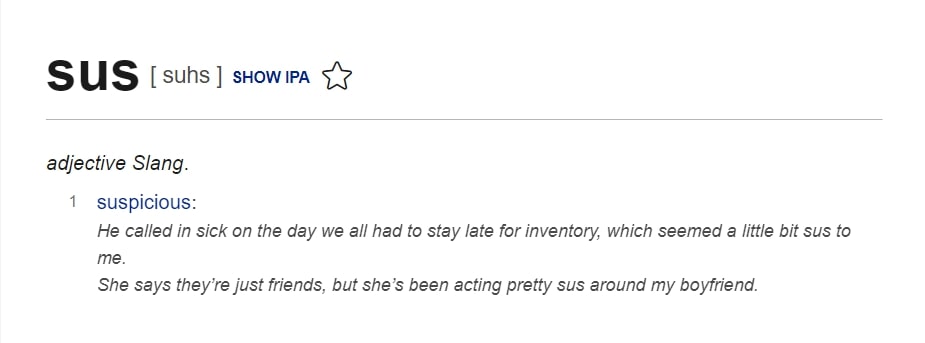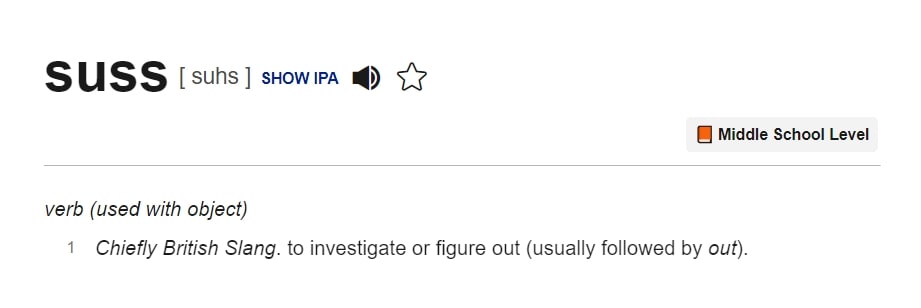What Does Sus Mean and Should Your Kids Use It?
ALL TOPICS
- Parent Monitoring Tips
- Monitoring Apps
- Social Media Parental Control
Dec 12, 2025 Filed to: Teen Slang Proven solutions

What does sus mean? You hear it often from your kids and see it in their texts. As it always happens when they learn a new word, you’re worried it might be dangerous or offensive, and considering what kids are exposed to these days, we can’t blame you.
Let us put your mind to rest because sus is a completely innocent word.
Here’s what it means and how to use it in the context of online slang:
Table of Content
Part 1: What Does Sus Mean?

Sus means suspect or suspicious.
For example, a teenager could send this text to her friend: I’m not sure who cheated on who, but Susie’s been acting all sus. Translated to boring parent language, it means that Susie has become disenchanted with her love choices and decided to find another boyfriend.
You may also hear your child say something like this to his older brother: Bro, I received a really sus text from Susie yesterday. Could you check it out? Sadly, this would mean that your son will have to start looking for another girlfriend because Susie is being shady, like her texts.
Depending on the context, sus can be used to express doubt or disbelief.
If somebody calls you out for sus behavior, they think you’re dishonest, untrustworthy, and deceitful. It can also mean that they are questioning your intentions.
Part 2: Sus Meaning in Chat and Other Online Conversations

Just like IDK, IMMD, boujee, vibe, and millions of other words you don’t understand, sus is a part of the internet vocabulary. Technically, it is slang. You should remember that even though some slang words have a naughty meaning, slang is a language like any other.
Even more so, online slang can be fantastically creative and clever.
Because this is the language of instant communication supported by the internet, most words in the online vocabulary are just abbreviated forms of English words with the same meaning. Who has time to type in the whole word when you can simply say sus, right?
In chat and other online conversations, sus indicates anything even remotely suspicious. Sometimes, however, it refers to a specific type of suspect – an imposter from the popular game Among Us. Even in this case, though, the meaning of the word is the same.
Part 3:Sus Variations

Because it is such a vital part of the game, many people believe that Among Us players are responsible for popularizing the word. It’s also worth mentioning that Among Us was released in 2018 but became viral during the lockdown, at the same time as sus.
However, the slang word dates way before Among Us and the pandemic.
It was first recorded in the online urban dictionary in 2003, but it’s much older than that. Sus likely originates from the British slang words sus and suss out.
In a way, a bougie person is the opposite of someone who is boujee.
In the UK, sus has the same meaning as in the US and the rest of the internet, but suss out has a slightly different meaning – to figure something out. They probably come from the same root since both refer to something that is shady, hiding its true nature or intentions.
Part 4: Talking To Your Kids About Sus Slang Meaning

According to research, slang could be incredibly important to a child’s development because it helps build a sense of community. Talking in slang with friends and peers is like having a secret language – it makes kids feel independent from adults and connected to each other.
In this particular case, you don’t even have to acknowledge it. However, if your kids start talking in slang so much that it feels like you’re raising foreigners, you should definitely talk to them about it. Rather than forbidding slang, ask them to teach you a couple of words.
Like any language, slang is only a tool we use to express ourselves.
So if your kids use slang to be offensive, it’s not slang’s fault.
Part 5: Bonus Tip: How To Keep Track of What Your Kid Is Saying Online

While on the topic of offensive slang, do you have any knowledge of what your kids are saying online? Freedom of speech is very important, especially to teenagers who need to be vocal and want to feel heard, but reasonable boundaries must exist even on the internet.
This isn’t about censorship – it’s about keeping kids safe.
You wouldn’t want your children to behave as bullies, just like you wouldn’t want them to be bullied. If sus is the worst type of slang that your kids are using, that’s fantastic news. However, if there’s something worse that you don’t understand, you should know about it.
Many parents use tracking apps like Wondershare FamiSafe for this.
On top of allowing you to see your kids’ online and phone activity – which means every site they visit and every app they use – FamiSafe also enables you to set alarms for specific keywords. If your child is saying something offensive online, you’ll receive a notification.
Play this video to know the risky teen slang and protect your kids from cyberbullying:
- Web Filter & SafeSearch
- Screen Time Limit & Schedule
- Location Tracking & Driving Report
- App Blocker & App Activity Tracker
- YouTube History Monitor & Video Blocker
- Social Media Texts & Porn Images Alerts
- Works on Mac, Windows, Android, iOS, Kindle Fire, Chromebook
Conclusion
Sus is a slang word used in the internet community to call out someone suspicious or describe their behavior, but it’s not intended as an insult. At worst, it can be subjective. If you hear your kids using it, that’s nothing to worry about, or should we say, that’s nothing sus.




Joanne Croft
staff Editor